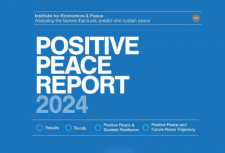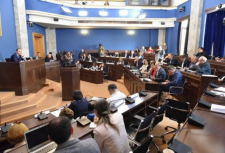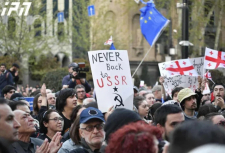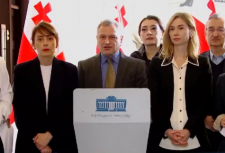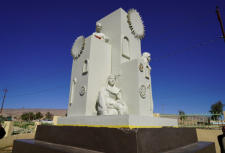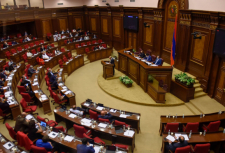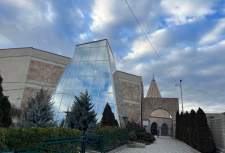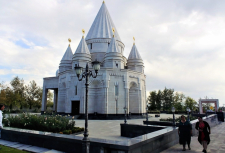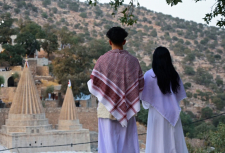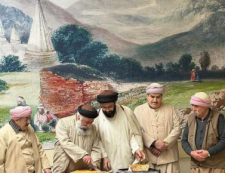"To be or not to be" - existential question of Yazidis
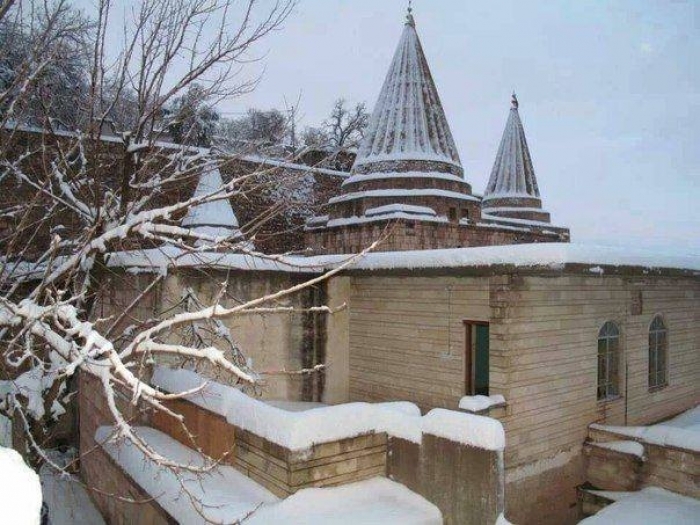
Employee of the Cultural Center of the Caucasus Yazidis and journalist Yazidis.info gave an interview to the Press club and information and analytical website "pressunity.org" concerning the Yazidi community and its prospects. You can read the interview below:
Interview with an employee Of the Cultural Сenter of the Caucasus Yazidis, master of international relations David Babayev.
Let's start our conversation with an elementary one: since mistakes are often made even in scientific and historical literature, explain what is the difference between Yazidis and Kurds?
The question is not really an elementary one, because, as you know, Yazidis are an ethno-religious people, and in our country, if you change your religion, switch to another denomination, you automatically cease to be considered a Yazid. And the Kurds at that time, in their majority, as we know, are Muslims, and therefore they are not Yazidis purely from a religious point of view.
You work in the Yazidi cultural center of the Caucasus. Tell me, why is it necessary to pay attention to the Yazidi issue right now? Is this due to the deterioration of the social situation in the South Caucasus States?
Yes, I am an employee Of the Cultural Center of the Caucasus Yazidis. We have our own website where we post topical questions about Yazidis, news from the Middle East, the Caucasus and some Western countries-from Europe and America.
In fact, there are only a few such centers in the Caucasus, namely in Georgia, and those that exist are passively reacting to events. All news about Yazidis is in a vacuum, it is difficult to find and read them without the position of a third party who tries to present information through the prism of their interests. Therefore, it was decided to create an organization that will deal with a purely Yazidi issue. You can view it on our website (approx. author — Yazidis.info), you will see articles about Yazidis - about culture, religion, history, and so on. In principle, there are no analogues of such an organization and website in the Caucasus.
What is the situation with the Yazidis of Georgia? Most of them live in Tbilisi, and less-by region. What can you say about the identity of the Georgian Yazidis?
In fact, the large outflow of Yazidis from Georgia occurred in two waves: the first was in the 90s, when the USSR collapsed, and many lefts for Russia and Europe. At that time, according to unofficial sources, there were about 30,000 Yazidis living in Georgia. Then in 2012 there was also an outflow, but this time to Europe, and now there are about 10,000 people in Georgia, but 8,000 of them remain adherents of their religion. Regarding integration, I can tell you this: the Yazidis are actually beginning to forget their roots — who they are, where they come from, they don't know much about their religion, of course, and they don't know the language. If you take young people of my age, I know my language more or less, but if you take others, there are few left who do. I can say that those who live in Georgia are too integrated into Georgian society. Unfortunately, there is a tendency that Yazidis are interested in a different religion and culture than their own. This is due to several factors: first, there are no centers that would instill knowledge about the Yazidi religion, culture, and language from infancy. No events are held, but even if they are, there are very few of them, and they are isolated. The second factor is education. Now the older generation, the generation of my parents, of course, not all, but most of them already forget about their roots. And their children, let's say, repeat their actions. They lose interest in all this. But there are also positive aspects: over the past 4-5 years, when a Yazidi temple was built in Georgia (approx. author — "Ziarat"), then people more interested in religion. They came and held events, but, unfortunately, not as often as we would like.
In 2012, it was decided to build the same Yazidi temple in Tbilisi, which was blessed by the now deceased spiritual leader of the Yazidi people, Baba Sheikh Khato Haji. Perhaps, now it is the most famous building in Georgia, related to the Yazidi culture. Tell me, are there any other cultural monuments that may receive less attention?
Not that I know of. There are no analogues close to this. We all know that our ancestors lived in the Soviet era, and then religion was in the background and did not play an important role in society. At that time, cultural structures of small ethnic groups were not built, much less religious ones. As you correctly noted, the most significant place in Tbilisi, in Georgia, is the Yazidi temple.
Yazidis, due to certain historical events, were forced to move to other countries and join life in other societies, but they preserved their roots thanks to traditions. What are the main traditions have been preserved in the Yezidi community of Georgia?
Correctly noted, in fact, the traditions remained. We are celebrating holidays, and one of the most important ones is That the Yazidis in Georgia, and, in principle, in Armenia, and in Russia, and those who left the post-Soviet space for Europe, still celebrate this holiday. There are still wedding traditions, some, of course, taken from another culture, assimilation occurred a little, but mostly, weddings are held according to Yazidi traditions. Holidays are generally held as in Iraq, but with minor differences. Their celebration is sometimes different from ours. Kloch itself is more traditional for the Yazidis of the post-Soviet space, and we have preserved it. I don't know about the future, but we're still celebrating it. We also celebrate Memorial Day every year.
How do you see the future of the Yazidi Diaspora in Georgia, and what should be done to preserve its identity?
As I mentioned earlier, there are positive trends. Organizations like ours are emerging. I hope that there will be more and more organizations that will be non-governmental and non-profit, and they will at least be engaged in holding events. This is the first thing. Second, we have a religious site in Tbilisi, one of the first in the Caucasus to be built outside of Iraq. The main question is how the future generation will look at all this. Because, let's just say, Yazidi families speak less and less of the Yazidi language. Less and less interest in their culture and traditions. If in the future there will be similar organizations that will have the goal of creating cultural events, and there will be at least some schools where our language will be taught, then our people have a future. Then it will not assimilate and disappear. But it depends on each of us, because we can't talk about it to others if it doesn't happen in our family. For example, if no one in my family speaks Yazidi, how can I ask another family to do this? The same rule applies to holidays, traditions, and culture. I think that if everyone looks into themselves and asks what they can do for their people, for their future, then we will have a positive trend in preserving their identity in the era of globalization".
Nino Skvortsova-Press club Correspondent in Georgia
Tags: #yazidisinfo #newsyezidi #aboutyazidi #yezidiofcaucasus
"To be or not to be" - existential question of Yazidis

Employee of the Cultural Center of the Caucasus Yazidis and journalist Yazidis.info gave an interview to the Press club and information and analytical website "pressunity.org" concerning the Yazidi community and its prospects. You can read the interview below:
Interview with an employee Of the Cultural Сenter of the Caucasus Yazidis, master of international relations David Babayev.
Let's start our conversation with an elementary one: since mistakes are often made even in scientific and historical literature, explain what is the difference between Yazidis and Kurds?
The question is not really an elementary one, because, as you know, Yazidis are an ethno-religious people, and in our country, if you change your religion, switch to another denomination, you automatically cease to be considered a Yazid. And the Kurds at that time, in their majority, as we know, are Muslims, and therefore they are not Yazidis purely from a religious point of view.
You work in the Yazidi cultural center of the Caucasus. Tell me, why is it necessary to pay attention to the Yazidi issue right now? Is this due to the deterioration of the social situation in the South Caucasus States?
Yes, I am an employee Of the Cultural Center of the Caucasus Yazidis. We have our own website where we post topical questions about Yazidis, news from the Middle East, the Caucasus and some Western countries-from Europe and America.
In fact, there are only a few such centers in the Caucasus, namely in Georgia, and those that exist are passively reacting to events. All news about Yazidis is in a vacuum, it is difficult to find and read them without the position of a third party who tries to present information through the prism of their interests. Therefore, it was decided to create an organization that will deal with a purely Yazidi issue. You can view it on our website (approx. author — Yazidis.info), you will see articles about Yazidis - about culture, religion, history, and so on. In principle, there are no analogues of such an organization and website in the Caucasus.
What is the situation with the Yazidis of Georgia? Most of them live in Tbilisi, and less-by region. What can you say about the identity of the Georgian Yazidis?
In fact, the large outflow of Yazidis from Georgia occurred in two waves: the first was in the 90s, when the USSR collapsed, and many lefts for Russia and Europe. At that time, according to unofficial sources, there were about 30,000 Yazidis living in Georgia. Then in 2012 there was also an outflow, but this time to Europe, and now there are about 10,000 people in Georgia, but 8,000 of them remain adherents of their religion. Regarding integration, I can tell you this: the Yazidis are actually beginning to forget their roots — who they are, where they come from, they don't know much about their religion, of course, and they don't know the language. If you take young people of my age, I know my language more or less, but if you take others, there are few left who do. I can say that those who live in Georgia are too integrated into Georgian society. Unfortunately, there is a tendency that Yazidis are interested in a different religion and culture than their own. This is due to several factors: first, there are no centers that would instill knowledge about the Yazidi religion, culture, and language from infancy. No events are held, but even if they are, there are very few of them, and they are isolated. The second factor is education. Now the older generation, the generation of my parents, of course, not all, but most of them already forget about their roots. And their children, let's say, repeat their actions. They lose interest in all this. But there are also positive aspects: over the past 4-5 years, when a Yazidi temple was built in Georgia (approx. author — "Ziarat"), then people more interested in religion. They came and held events, but, unfortunately, not as often as we would like.
In 2012, it was decided to build the same Yazidi temple in Tbilisi, which was blessed by the now deceased spiritual leader of the Yazidi people, Baba Sheikh Khato Haji. Perhaps, now it is the most famous building in Georgia, related to the Yazidi culture. Tell me, are there any other cultural monuments that may receive less attention?
Not that I know of. There are no analogues close to this. We all know that our ancestors lived in the Soviet era, and then religion was in the background and did not play an important role in society. At that time, cultural structures of small ethnic groups were not built, much less religious ones. As you correctly noted, the most significant place in Tbilisi, in Georgia, is the Yazidi temple.
Yazidis, due to certain historical events, were forced to move to other countries and join life in other societies, but they preserved their roots thanks to traditions. What are the main traditions have been preserved in the Yezidi community of Georgia?
Correctly noted, in fact, the traditions remained. We are celebrating holidays, and one of the most important ones is That the Yazidis in Georgia, and, in principle, in Armenia, and in Russia, and those who left the post-Soviet space for Europe, still celebrate this holiday. There are still wedding traditions, some, of course, taken from another culture, assimilation occurred a little, but mostly, weddings are held according to Yazidi traditions. Holidays are generally held as in Iraq, but with minor differences. Their celebration is sometimes different from ours. Kloch itself is more traditional for the Yazidis of the post-Soviet space, and we have preserved it. I don't know about the future, but we're still celebrating it. We also celebrate Memorial Day every year.
How do you see the future of the Yazidi Diaspora in Georgia, and what should be done to preserve its identity?
As I mentioned earlier, there are positive trends. Organizations like ours are emerging. I hope that there will be more and more organizations that will be non-governmental and non-profit, and they will at least be engaged in holding events. This is the first thing. Second, we have a religious site in Tbilisi, one of the first in the Caucasus to be built outside of Iraq. The main question is how the future generation will look at all this. Because, let's just say, Yazidi families speak less and less of the Yazidi language. Less and less interest in their culture and traditions. If in the future there will be similar organizations that will have the goal of creating cultural events, and there will be at least some schools where our language will be taught, then our people have a future. Then it will not assimilate and disappear. But it depends on each of us, because we can't talk about it to others if it doesn't happen in our family. For example, if no one in my family speaks Yazidi, how can I ask another family to do this? The same rule applies to holidays, traditions, and culture. I think that if everyone looks into themselves and asks what they can do for their people, for their future, then we will have a positive trend in preserving their identity in the era of globalization".
Nino Skvortsova-Press club Correspondent in Georgia
Tags: #yazidisinfo #newsyezidi #aboutyazidi #yezidiofcaucasus
